The End of Australia Day — and Australia
Gregory Hood, American Renaissance, February 17, 2023
If you aren’t willing to defend white settlement, you won’t have a country left.
This video is available on Rumble, BitChute, and Odysee.
Recently, Australia celebrated Australia Day, which commemorates the arrival of the First Fleet under captain Arthur Phillip, the arrival of European settlers, the Founding of Australia.
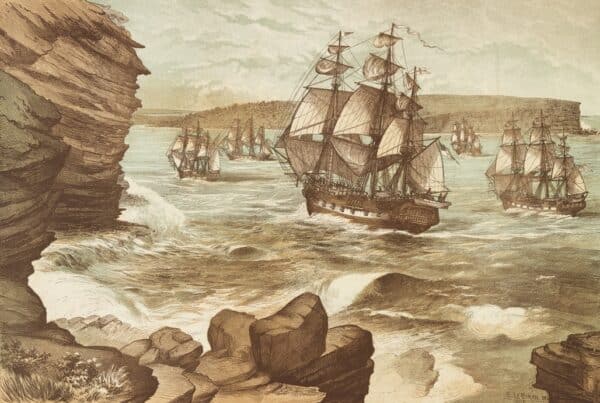
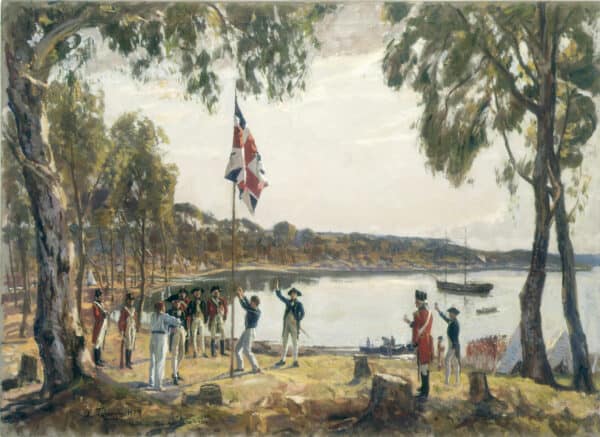
It’s the fundamental national holiday, the equivalent of America’s Fourth of July and is marked with the usual celebrations – parades, cookouts, the kind of harmless and inclusive activities everyone could participate in.
Or at least you used to be able to – because it looks like Australia itself is being canceled. In fact, Australia Day is now being turned into a day of mourning. If you’re American, this should sound familiar, because it’s the same thing that happened to Columbus Day.
Take Wollongong University, where Australia Day is being called “Invasion Day” and employees are being given the choice whether to work or not. “For our First Nations colleagues, it’s clearly a day they don’t want to recognize as celebration,” said the vice-chancellor, as quoted in The Guardian.
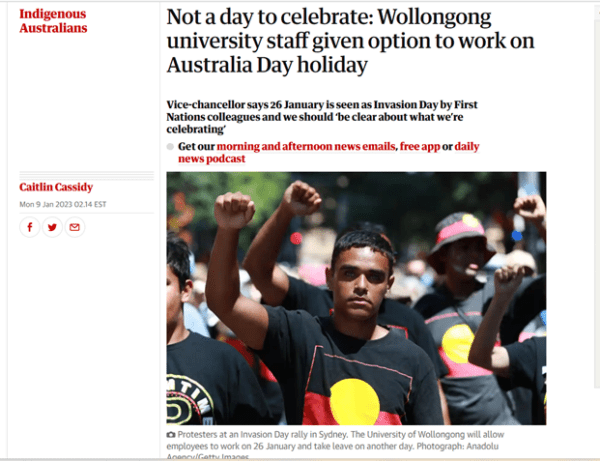
The Australian Open, for example, did not recognize Australia Day — no fireworks, no national anthem. “We acknowledge the historical significance and deep spiritual connection our First Peoples have to this land and recognize this with a Welcome to Country on stadium screens prior to both the day and night session daily.” This is supposedly what it means to be “inclusive to all.” But it is holding a First Nations Day and a “Glam Slam” event for LGBT and whatever other letters and symbols get added these days.
Others in sports are opposed to the day. Jason Gillespie, a well-known cricket star who is part Aboriginal, said he wants “a day in which all Australians can celebrate” and that the “conversations need to continue to explore an alternative.”
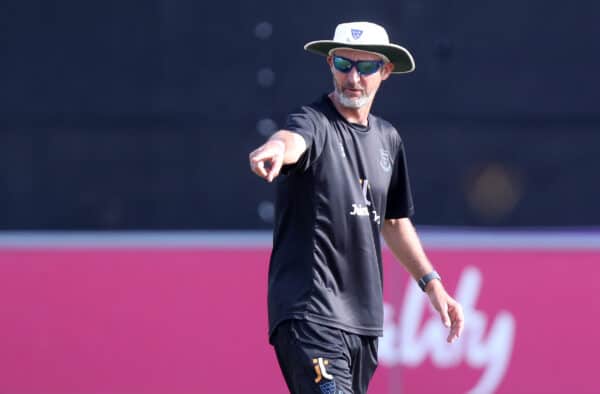
Credit Image: © Nick Wood/PA Wire via ZUMA Press
The women’s cricket star Ashleigh Gardner said “for those who don’t have a good understanding of what that day means it was the beginning of genocide, massacres, and dispossession.” The solution, as always, is “raising awareness.”

Credit Image: © Mi News/NurPhoto via ZUMA Press
The website Cricket Australia says it “acknowledges 26 January is a day that has multiple meanings and evokes mixed feelings in communities across our richly diverse nation,” and that for some, it is “a day of mourning.”
All right, some woke sports stars, but what about the government? In Victoria, the second most populated state and home of the city of Melbourne, the Australia Day parade has been cancelled for the last two years, ostensibly due to COVID-19. This year, the government canceled it for explicitly political reasons. Even before COVID-19 and the so-called racial reckoning, there were fewer people coming to Australia Day events. Melbourne estimates 72,000 people attended Australia Day events in 2018, but just 12,000 in 2019, and a paltry 2000 in 2020.
Why is this happening? A so-called First Nations leader, was opposed to the parade. “The parade was a slap in the face and only rubs salt in the wounds,” said First Peoples’ Assembly leader Marcus Stewart. “It was a mark of the harm and the hurt that was caused through colonization.” A Victoria government spokesman said, “We recognize that Australia Day represents a time of mourning and reflection for some Victorians and is a challenging time for First Peoples.” The First Nations leader went on to say that “Now we can start a mature dialogue in this country around what a day looks like, that we can all celebrate a day that brings us together and doesn’t push us apart.”
The prime minister, Anthony Albanese, says it’s up to employers and employees whether they choose to stay home on Australia Day or keep working. Working could be considered a kind of protest – owning the conservatives by refusing to take a holiday I suppose.
What about corporate leaders? After all, leftists tell us that big business is on the side of reactionary nationalism and conservatism. Well, the CEO of mobile phone provider Telstra Corp., Vicki Brady, said she’s working out of respect for Indigenous Australians. To her, the holiday “marks a turning point that saw lives lost, culture devalued, and connections between people and places destroyed.” Kmart told Bloomberg that it had been moving away from selling merchandise celebrating the holiday. Woolsworth told employees it’s up to them whether they want to work or not.
I think Bloomberg is representative of the elite, capitalist, pro-business line on world events. And it summarizes all this as “Australia Begins Moving Away from its Controversial National Day.” “Top Australian political and business figures are beginning to distance themselves from the country’s controversial national holiday, amid growing pressure to eradicate a day marking the start of British colonization.” Pretty strong word choice there.
But “controversial” to whom? A recent poll found almost two-thirds of Australians want January 26 to be known as Australia Day. There’s a bit of a gender divide but solid majorities of both men and women want January 26 to be called Australia Day instead of “Invasion Day.” However, there is trouble on the horizon. A majority of those under 35 want January 26 to be known as “Invasion Day” – essentially a national festival of shame. And though the majority is on the side of the traditional holiday now, it declines a little bit each year.
Indoctrination works. Incentives work. Propaganda works. If you tell young people that they should hate their history and be ashamed of who they are, they will be.
But there’s also something else going on that’s much simpler. It’s about power. I’m not the only one who notices that many of these Aboriginals probably wouldn’t draw a glance at an American Renaissance conference.
For example, here’s Professor Mark McMillan.
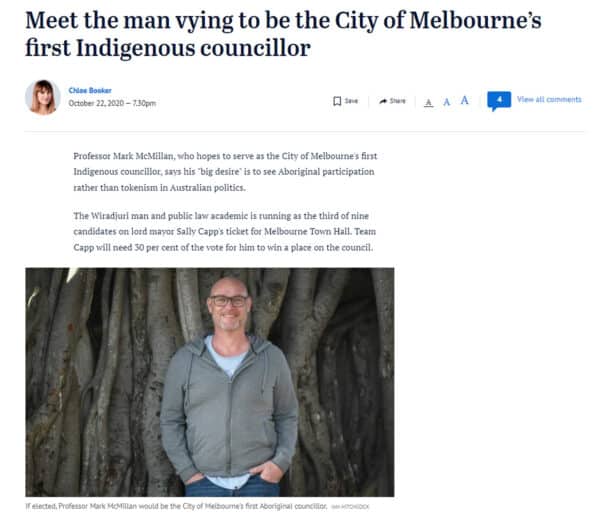
Now, I’m not saying he’s not an Aborigine. In fact, an Australian court said that doing so would be illegal, so I need to be extra careful. And if he says he is, sure, I have no reason to doubt him.
Here’s the first known Indigenous woman to graduate with an MBA from Sydney.
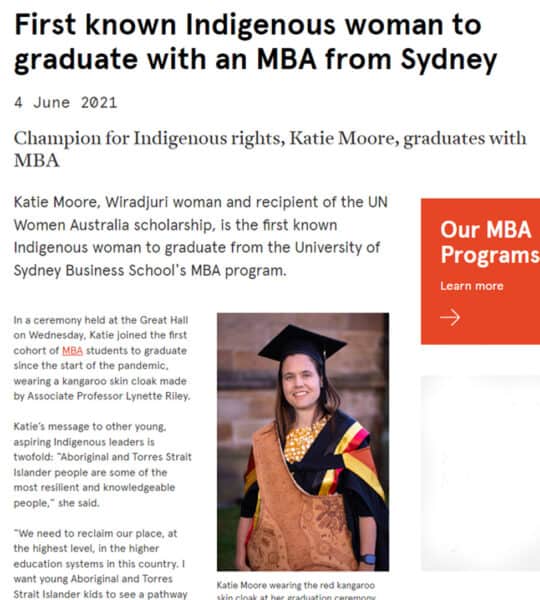
Here’s Dr. Amy Thunig.
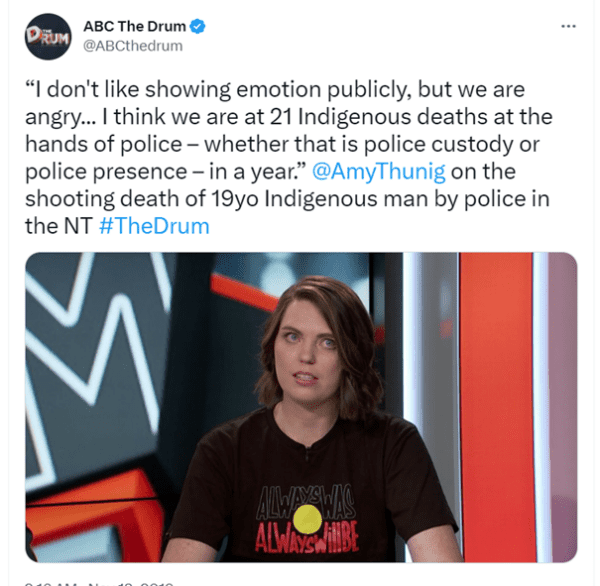

She’s complaining about white journalists opining on the problems with Aborigines. I mean, I have to agree with her, I’m pretty sick of hearing journalists talk about minority communities too.
I’m not saying these people are fakers. But apparently, white people claiming to Abos are becoming a real problem. Here we run into that great contradiction of modern race relations. We’re told race is just a social construct. If that’s true, why shouldn’t people with any Aboriginal descent, or perhaps even just a strong cultural connection, get to say they are Aboriginal? In fact, if Abos are truly oppressed, wouldn’t such people be undertaking a heroic sacrifice?
And there have been quite a few cases of white people claiming fake Aboriginal identity. As in America, being part of the so-called marginalized group gets you more power, more favorable coverage, and apparently the right to dictate to the rest of the country what holidays they can and cannot celebrate.
Why did this madness start? Either with good intensions, cynical politics, or just plain stupidity. Here’s Labor Prime Minister Paul Keating, a white man.
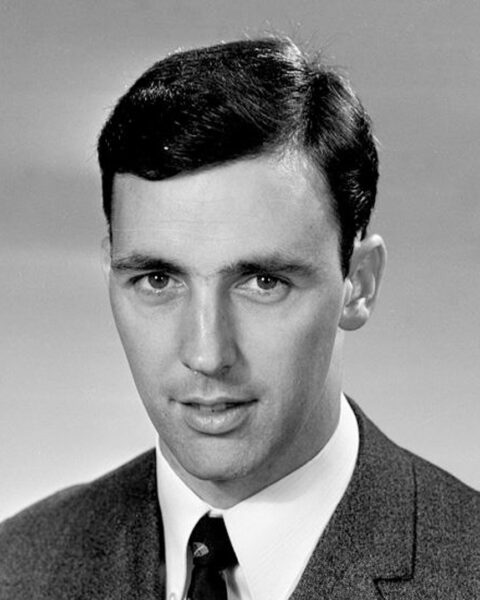
That’s him after he was first elected to Parliament. Once he became prime minister, he arguably redefined the whole country when he said in 1992:
Isn’t it reasonable to say that if we can build a prosperous and remarkably harmonious multicultural society in Australia, surely we can find just solutions to the problems which beset the first Australians, the people to whom the most injustice has been done. And, as I say, the starting point might be to recognize that the problem starts with us non-Aboriginal Australians. It begins, I think, with that act of recognition.
Recognition that it was we who did the dispossessing. We took the traditional lands and smashed the traditional way of life. We brought the diseases. The alcohol. We committed the murders. We took the children from their mothers. We practiced discrimination and exclusion. It was our ignorance and our prejudice.
This paved the way for something that has now become traditional in Australia, the “Acknowledgement of Country” practice, in which the speaker has to say which tribe or group’s land he is on, acknowledge that it’s someone else’s, don’t use the word Aborigines, because that’s derogatory apparently, and essentially apologize for being here. What’s remarkable about this, leaving aside the idea that a group has a permanent hold on any group of land forever, is that it is a flat-out endorsement of blood-and-soil ethnonationalism. Like I always say, there are very few actual leftists. There are plenty of far right ethnonationalists in Western countries, they just aren’t Westerners.
For example, here’s Australian Senator Lidia Thorpe being sworn into the Australian Parliament in 2010, with the image taken from the Australian Greens website. She received some controversy when during the Oath of Allegiance to the Queen, she called the queen a colonizer.
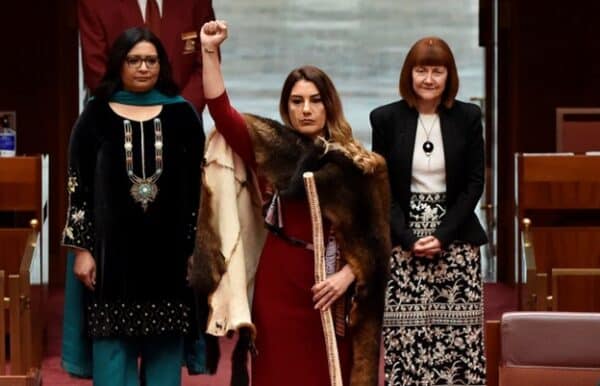
She was forced to recite the oath word by word, but she went on to say the Australian flag didn’t represent her and that sovereignty was never ceded. Assuming we take the Aboriginal heritage in good faith, let’s think about this. If she doesn’t consider herself part of Australia, why should Australians have to listen to her, let alone do anything she says?
What kind of country is Australia going to be? According to the government, Aboriginals are about 3.2% of the population – and I’m guessing from some of these pictures that the definition is pretty loose. But some want a Treaty saying they are the true owners of the land. And they are making an impact. For example, King Charles III will not replace his mother on Australian currency, at least not on banknotes, because the powers that be want First Nations to be at the center of modern Australia.
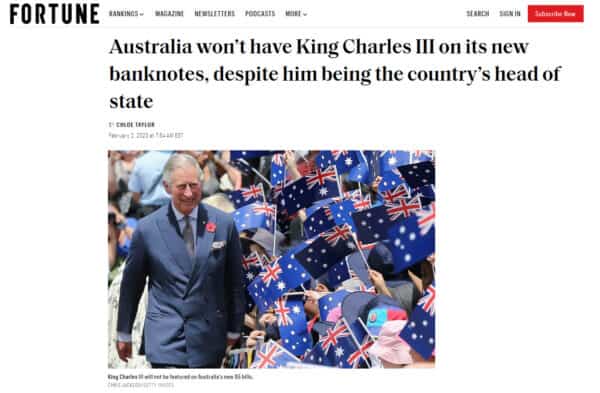
We see the same things happening around the world, especially in the Anglosphere. Land acknowledgements have long been part of Canadian political rhetoric. It’s coming to America, and New Zealand is even toying with changing its name. Suddenly, the biological reality of race or the ethnic basis of nationhood is unquestionable. It’s just being used against whites.
I know you don’t want to think about this. Australia Day is a great example of a day when people just want to grill, just like the Fourth of July. Most want countries where peoples of different backgrounds live in peace, where we have a common heritage and celebrate being part of countries that are objectively some of the best places to live in the world. But we didn’t start this. We are the ones being told that we must give up our homes, our histories, and our dignity – just to satisfy the egos of some pretty cynical politicians and activists. You may just want to grill, but they are not going to let you. And you are going to have to have the moral courage to say that it was a good thing your white ancestors came to Australia, and New Zealand, and Canada, and America, and all these other places and built these amazing societies. If you aren’t willing to say that, they are just going to keep pushing. And it will just get worse.















